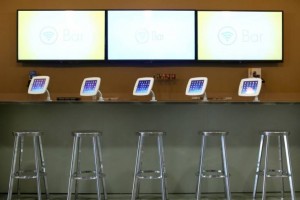 Ochsner Health System in New Orleans made headlines last summer when it launched the O Bar, the first "Genius Bar-type" in-person center for learning about health and wellness apps. Now a report from WWL, a local CBS news outlet, says the hospital has a roster of two to three hundred apps it's recommending.
Ochsner Health System in New Orleans made headlines last summer when it launched the O Bar, the first "Genius Bar-type" in-person center for learning about health and wellness apps. Now a report from WWL, a local CBS news outlet, says the hospital has a roster of two to three hundred apps it's recommending.
The apps run the gamut from food and nutrition tracking, to fitness and activity, to apps that help manage chronic conditions like diabetes. Some help users quit smoking while others offer support and education to expectant mothers.
A room in the Ochsner Center for Primary Care and Wellness has a fleet of five iPads locked to a bar, each one loaded with all the apps the health system has vetted and approved. The O Bar is staffed by a technology specialist that can help patients find out what's available and help teach them to download and use the available apps.
“The apps are out there and people are going to get them,” Ochsner's Chief Clinical Transformation Officer Richard Milani told H&HN Magazine last year. “The smart thing for us to do is get our hands around what we think are pretty good apps and make them more helpful to patients.”
Many of the apps Ochsner recommends at the O Bar help patients track their vital signs and even integrate with Apple HealthKit. An Ochsner patient told WWL she was using apps to monitor her sleep, blood pressure, and exercise.
"He also showed me that I can connect all of the data that I've been collecting on my iPhone Health app, which I didn't realize that all connected," she said. "So I can look at a dashboard and see my blood pressure, my weight, my activity levels, everything all in one place."
Ochsner became the first Epic client to integrate with Apple HealthKit back in October, according to a press release from the health system. They initially launched a pilot for heart patients, which used HealthKit to connect data from the patients' wireless scales to their doctors, who could then adjust their medication over the phone.
At the mHealth Summit, Milani took the stage for a Q&A about working with Apple's Health app. He stressed the value of apps and wearables for treating patients with chronic disease.
"Chronic disease is responsible for 70 percent of the deaths and 75 percent of the healthcare costs in the nation," he said at the time. "The components that create chronic disease are primarily lifestyle-related. Anyone who manages chronic disease is going to be interested in this as a provider. We're all looking for ways to get patients more involved in their own care."
A number of other hospitals are premiering HealthKit integrations, and at least one other hospital, Morristown Medical Center in New Jersey, has a similar on-site health app store. But Ochsner is on the cutting edge of both. Milani says that's because the patient and physician demand for these tools has already arrived.
"We were anxious to start and I guess our sense of urgency came from both physicians and patients," he said at the Summit. "We had a lot of patients that were clamoring. They’re tired of entering blood pressure data with a pen and pencil. They’d like to see it in the medical record. And certainly on the physician side much the same thing. Physicians asked and we listened."

















